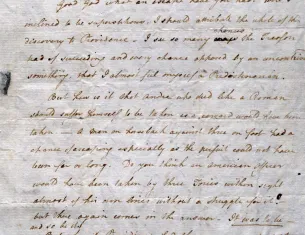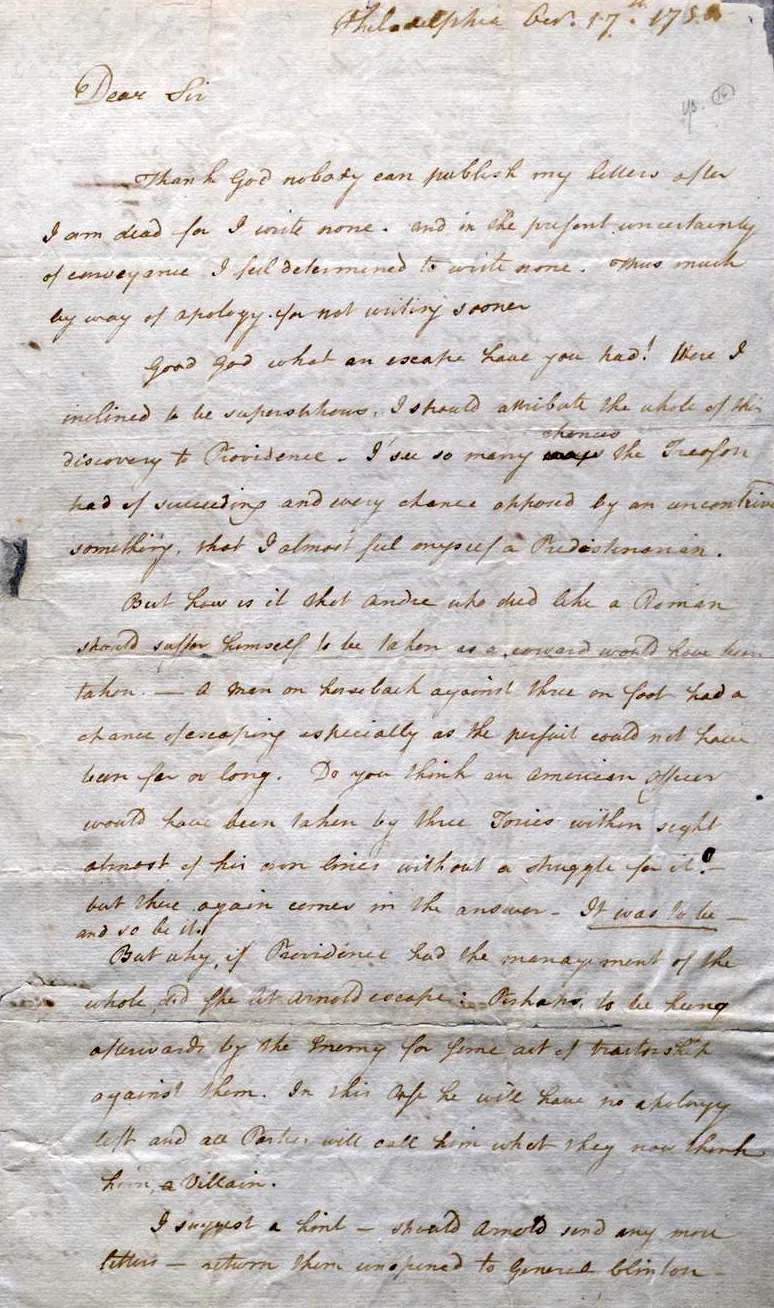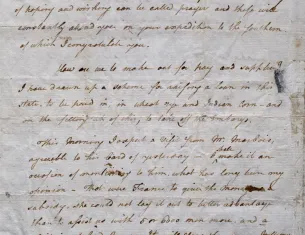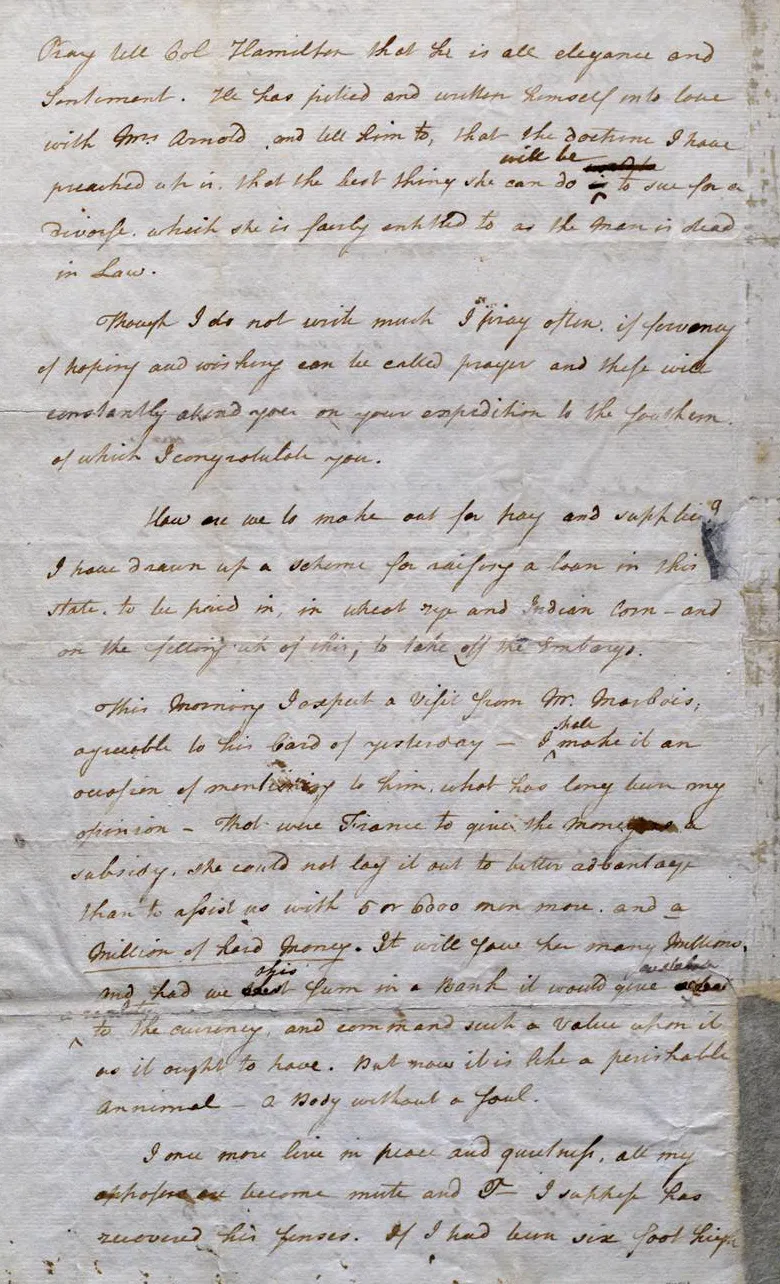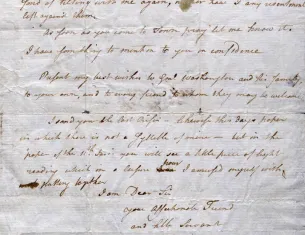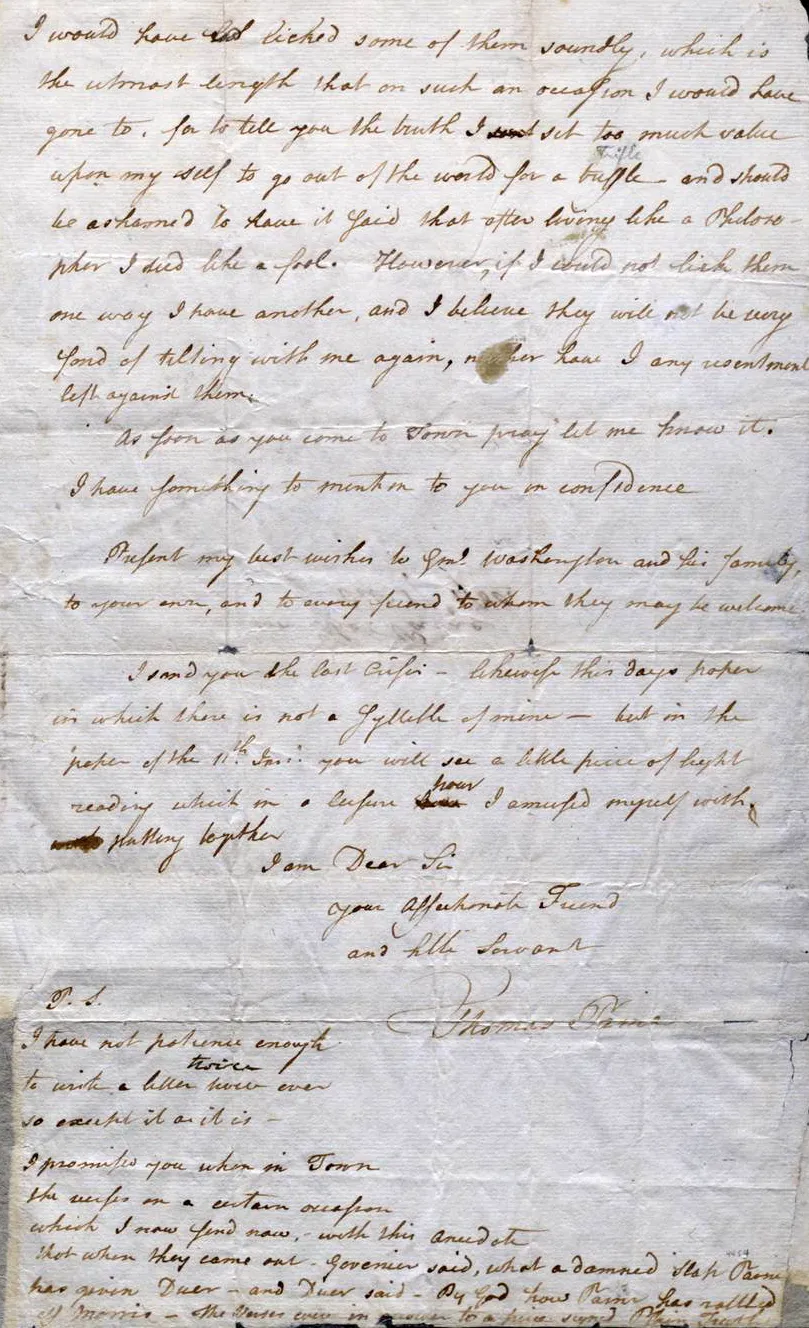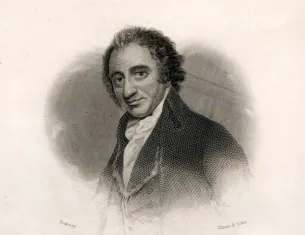Thomas Paine Writes to General Greene about Benedict Arnold and John Andre, 1780
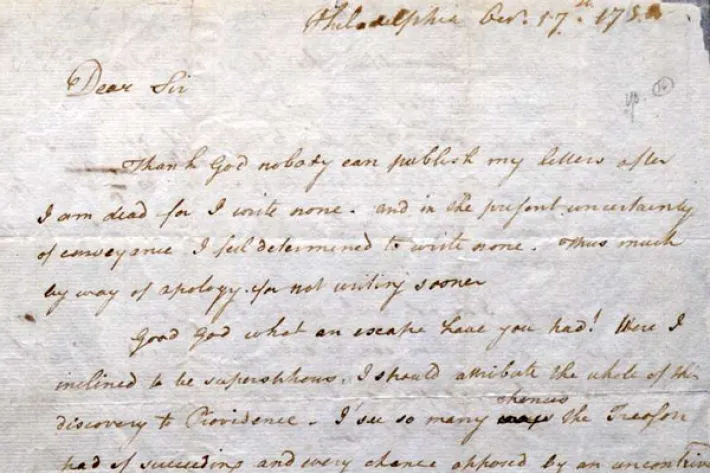
Thomas Paine to Nathanael Greene, October 17, 1780 (The Gilder Lehrman Institute of American History)
Thomas Paine had briefly served as an aide to General Nathanael Greene during the American Revolution. Greene was one of the officers who presided over the trial of the British officer Major John Andre and sentenced him to death for his role in the plan to turn West Point over to the British. When Paine heard about Andre’s capture and the escape of the treacherous American general Benedict Arnold, he wrote to Greene at length on October 17, 1780.
A Letter from Thomas Paine to Nathanael Greene, October 17, 1780
Philadelphia Octr. 17th. 1780
Dear Sir
Thank God nobody can publish my letters after I am dead for I write none and in the present uncertainty of conveyance I feel determined to write none. Thus much by way of apology for not writing sooner
Good God what an escape have you had! Were I inclined to be superstitious, I should attribute the whole of this discovery to Providence. I see so many chances the Treason had of succeeding and every chance opposed by an uncontrived something, that I almost feel myself a Predestinarian.
But how is it that Andre who died like a Roman should suffer himself to be taken as a coward would have been taken. – A man on horseback against three on foot had a chance of escaping especially as the pursuit could not have been far or long. Do you think an American Officer would have been taken by three Tories within sight almost of his own lines without a struggle for it? — but there again comes in the answer. It was to be – and so be it.
But why, if Providence had the management of the whole, did she let Arnold escape: Perhaps to be hung afterwards by the Enemy for some act of traitorship against them. In this Case he will have no apology left and all Parties will call him what they now think him, Villain.
I suggest a hint – should Arnold send any more letters – return them unopened to General Clinton – Pray tell Col Hamilton that he is all elegance and Sentiment. He has pited and written himself into love with Mrs. Arnold and tell him to, that the doctrine I have preached up is, that the best thing she can do will be to sue for a divorse which she is fairly entitled to as the man is dead in Law.
Though I do not write much I pray often. if fervency of hoping and wishing can be called prayer, and these will constantly attend you on your expedition to the southern of which I congratulate you.
How are we to make out for pay and supplies? I have drawn up a scheme for raising a loan in this state. to be paid in, in wheat rye and Indian corn – and on the filling up of this, to take off the Embargo.
This Morning I expect a visit from Mr. Marbois, agreeable to his Card of yesterday – I shall make it an occasion of mentioning to him, what has long been my opinion – That were France to give the money a subsidy, she could not lay it out to better advantage than to assist us with 5 or 6000 men more. and a million of hard Money. It will save her many Millions And had we this Sum in a Bank it would give [inserted: illegible] a reality to the currency, and command such a Value upon it as it ought to have. But now it is like a perishable annimal – a Body without a soul.
I once more live in peace and quietness, all my opposers are become mute and T– I suppose has recovered his senses. If I had been six foot high I would have licked some of them soundly, which is the utmost length that on such an occasion I would have gone to, for to tell you the truth I set too much value upon my self to go out of the world for a trifle and should be ashamed to have it said that after living like a Philosopher I died like a fool. However, if I could not lick them one way I have another, and I believe they will not be very fond of tilting with me again, neither have I any resentment left against them.
As soon as you come to Town pray let me know it. I have something to mention to you in confidence.
Present my best wishes to Genl. Washington and his family, to your own, and to every friend to whom they may be welcome.
I send you the last Crisis – likewise this days paper in which there is not a Syllable of mine – but in the paper of the 11th. Inst. you will see a little piece of light reading which in a leisure hour I amused myself with putting together.
I am Dear Sir
your Affectionate Friend
and hble Servant
Thomas Paine
P.S. I have not patience enough to write a letter twice over so except it as it is – I promised you when in Town the verses on a certain occasion which I now send now, – with this Anecdote that when they came out Govenier said, what a damned Slap Paine has given Duer, – and Duer said, – By God how Paine has rattled off Morris – The Verses were in answer to a piece signed Plain Truth
Source: Thomas Paine to Nathanael Greent, October 17, 1780, The Gilder Lehrman Institute of American History, GLC04454.
A Letter from Thomas Paine to Nathanael Greene, October 17, 1780
Philadelphia Octr. 17th. 1780
Dear Sir
. . . Good God what an escape have you had! Were I inclined to be superstitious, I should attribute the whole of this discovery to Providence. I see so many chances the Treason had of succeeding and every chance opposed by an uncontrived something, that I almost feel myself a Predestinarian.
But how is it that Andre who died like a Roman should suffer himself to be taken as a coward would have been taken. – A man on horseback against three on foot had a chance of escaping especially as the pursuit could not have been far or long. Do you think an American Officer would have been taken by three Tories within sight almost of his own lines without a struggle for it? — but there again comes in the answer. It was to be – and so be it.
But why, if Providence had the management of the whole, did she let Arnold escape: Perhaps to be hung afterwards by the Enemy for some act of traitorship against them. In this Case he will have no apology left and all Parties will call him what they now think him, Villain.
I suggest a hint – should Arnold send any more letters – return them unopened to General Clinton – Pray tell Col Hamilton that he is all elegance and Sentiment. He has pited and written himself into love with Mrs. Arnold and tell him to, that the doctrine I have preached up is, that the best thing she can do will be to sue for a divorce which she is fairly entitled to as the man is dead in Law . . .
As soon as you come to Town pray let me know it. I have something to mention to you in confidence.
Present my best wishes to Genl. Washington and his family, to your own, and to every friend to whom they may be welcome.
I send you the last Crisis – . . . you will see a little piece of light reading which in a leisure hour I amused myself with putting together.
I am Dear Sir
your Affectionate Friend
and hble Servant
Thomas Paine
Source: Thomas Paine to Nathanael Greene, October 17, 1780, The Gilder Lehrman Institute of American History, GLC04454.
Providence - God
treason - betrayal of one’s government
Tories - supporters of the British in American Revolution
Background
Thomas Paine had briefly served as an aide to General Nathanael Greene during the American Revolution. Greene was one of the officers who presided over the trial of the British officer Major John Andre and sentenced him to death for his role in the plan to turn West Point over to the British. When Paine heard about Andre’s capture and the escape of the treacherous American general Benedict Arnold, he wrote to Greene at length on October 17, 1780.
Transcript
A Letter from Thomas Paine to Nathanael Greene, October 17, 1780
Philadelphia Octr. 17th. 1780
Dear Sir
Thank God nobody can publish my letters after I am dead for I write none and in the present uncertainty of conveyance I feel determined to write none. Thus much by way of apology for not writing sooner
Good God what an escape have you had! Were I inclined to be superstitious, I should attribute the whole of this discovery to Providence. I see so many chances the Treason had of succeeding and every chance opposed by an uncontrived something, that I almost feel myself a Predestinarian.
But how is it that Andre who died like a Roman should suffer himself to be taken as a coward would have been taken. – A man on horseback against three on foot had a chance of escaping especially as the pursuit could not have been far or long. Do you think an American Officer would have been taken by three Tories within sight almost of his own lines without a struggle for it? — but there again comes in the answer. It was to be – and so be it.
But why, if Providence had the management of the whole, did she let Arnold escape: Perhaps to be hung afterwards by the Enemy for some act of traitorship against them. In this Case he will have no apology left and all Parties will call him what they now think him, Villain.
I suggest a hint – should Arnold send any more letters – return them unopened to General Clinton – Pray tell Col Hamilton that he is all elegance and Sentiment. He has pited and written himself into love with Mrs. Arnold and tell him to, that the doctrine I have preached up is, that the best thing she can do will be to sue for a divorse which she is fairly entitled to as the man is dead in Law.
Though I do not write much I pray often. if fervency of hoping and wishing can be called prayer, and these will constantly attend you on your expedition to the southern of which I congratulate you.
How are we to make out for pay and supplies? I have drawn up a scheme for raising a loan in this state. to be paid in, in wheat rye and Indian corn – and on the filling up of this, to take off the Embargo.
This Morning I expect a visit from Mr. Marbois, agreeable to his Card of yesterday – I shall make it an occasion of mentioning to him, what has long been my opinion – That were France to give the money a subsidy, she could not lay it out to better advantage than to assist us with 5 or 6000 men more. and a million of hard Money. It will save her many Millions And had we this Sum in a Bank it would give [inserted: illegible] a reality to the currency, and command such a Value upon it as it ought to have. But now it is like a perishable annimal – a Body without a soul.
I once more live in peace and quietness, all my opposers are become mute and T– I suppose has recovered his senses. If I had been six foot high I would have licked some of them soundly, which is the utmost length that on such an occasion I would have gone to, for to tell you the truth I set too much value upon my self to go out of the world for a trifle and should be ashamed to have it said that after living like a Philosopher I died like a fool. However, if I could not lick them one way I have another, and I believe they will not be very fond of tilting with me again, neither have I any resentment left against them.
As soon as you come to Town pray let me know it. I have something to mention to you in confidence.
Present my best wishes to Genl. Washington and his family, to your own, and to every friend to whom they may be welcome.
I send you the last Crisis – likewise this days paper in which there is not a Syllable of mine – but in the paper of the 11th. Inst. you will see a little piece of light reading which in a leisure hour I amused myself with putting together.
I am Dear Sir
your Affectionate Friend
and hble Servant
Thomas Paine
P.S. I have not patience enough to write a letter twice over so except it as it is – I promised you when in Town the verses on a certain occasion which I now send now, – with this Anecdote that when they came out Govenier said, what a damned Slap Paine has given Duer, – and Duer said, – By God how Paine has rattled off Morris – The Verses were in answer to a piece signed Plain Truth
Source: Thomas Paine to Nathanael Greent, October 17, 1780, The Gilder Lehrman Institute of American History, GLC04454.
Excerpt
A Letter from Thomas Paine to Nathanael Greene, October 17, 1780
Philadelphia Octr. 17th. 1780
Dear Sir
. . . Good God what an escape have you had! Were I inclined to be superstitious, I should attribute the whole of this discovery to Providence. I see so many chances the Treason had of succeeding and every chance opposed by an uncontrived something, that I almost feel myself a Predestinarian.
But how is it that Andre who died like a Roman should suffer himself to be taken as a coward would have been taken. – A man on horseback against three on foot had a chance of escaping especially as the pursuit could not have been far or long. Do you think an American Officer would have been taken by three Tories within sight almost of his own lines without a struggle for it? — but there again comes in the answer. It was to be – and so be it.
But why, if Providence had the management of the whole, did she let Arnold escape: Perhaps to be hung afterwards by the Enemy for some act of traitorship against them. In this Case he will have no apology left and all Parties will call him what they now think him, Villain.
I suggest a hint – should Arnold send any more letters – return them unopened to General Clinton – Pray tell Col Hamilton that he is all elegance and Sentiment. He has pited and written himself into love with Mrs. Arnold and tell him to, that the doctrine I have preached up is, that the best thing she can do will be to sue for a divorce which she is fairly entitled to as the man is dead in Law . . .
As soon as you come to Town pray let me know it. I have something to mention to you in confidence.
Present my best wishes to Genl. Washington and his family, to your own, and to every friend to whom they may be welcome.
I send you the last Crisis – . . . you will see a little piece of light reading which in a leisure hour I amused myself with putting together.
I am Dear Sir
your Affectionate Friend
and hble Servant
Thomas Paine
Source: Thomas Paine to Nathanael Greene, October 17, 1780, The Gilder Lehrman Institute of American History, GLC04454.
Providence - God
treason - betrayal of one’s government
Tories - supporters of the British in American Revolution
